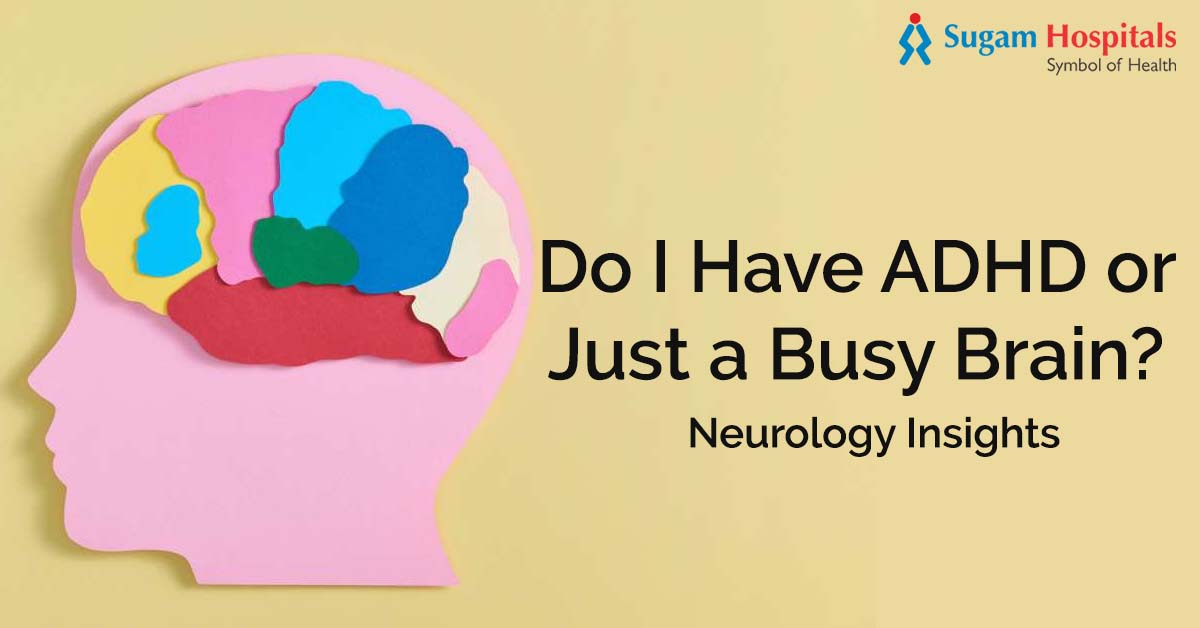Do I Have ADHD or Just a Busy Brain? Neurology Insights

Do I Have ADHD or Just a Busy Brain? Neurology Insights
July 2, 2025 by adminIn today’s busy world, we can often feel overwhelmed, forgetful, or distracted. You might find yourself asking, “Do I have ADHD or is my brain just stuffed with too many things at a time. It’s a fair question especially when you are trying hard to concentrate.
Understanding the difference between a genuinely busy brain and Attention-Deficit/Hyperactivity Disorder (ADHD) can help you figure out whether what you’re experiencing is part of everyday life or something that needs medical attention.
Let’s break it down with insights from neurology.
What Is ADHD, Really?
ADHD is a neurological condition that affects attention, focus, memory, and impulse control. It is often diagnosed during childhood, can persist into adulthood or appear for the first time in adulthood without a prior diagnosis.
It is important to realize: Not everyone who struggles with focus has ADHD. While we can have distraction as a common experience, ADHD affects our attention with specific patterns and symptoms that interfere with functioning in a regular way.
Typical symptoms related to ADHD in adults
ADHD in adults can manifest in different ways than seen in children. Instead of running around or interrupting people, adults may have:
- Difficulty making it through tasks or focusing on one
- misplace things frequently
- Bad time management skills
- Restlessness or anxiety
- Forgetting meetings or commitments
- Difficulty executing on what they have been asked to do
These patterns are usually more than occasional; they happen often, and they limit work, relationships, or living their everyday lives.
Busy Brain or ADHD? Key Differences
| Busy Brain | ADHD |
| You can focus when you need to or in calm situations | Attention is inconsistent even in low-pressure situations |
| You can get things done with effort | Tasks are left incomplete despite trying hard |
| You forget sometimes | Forgetting things often relates to family and responsibilities |
| You have been feeling better with better sleep and structure | These issues remain even with sleep, routines, and organizational tools. |
A busy brain may need a break or better time management strategies. With ADHD, it’s a chronic condition with neurological rooted.
Neurological Basis of ADHD
The brain is composed of information processing and executive function. When one has ADHD, it typically reflects:
- Decreased dopamine activity – It is also in part a reflection of motivation, reward processing.
- Frontal lobe dysregulation – This impacts one’s capacity to make decisions based on memory and attention.
- Altered connectivity in the brain – Individuals struggle filtering distractions
Both structural and functional brain imaging have revealed differences in individuals with ADHD, mainly in the self-regulatory area.
What Creates ADHD?
There is no one cause but many factors might contribute to ADHD:
- Genetics: ADHD often runs in families
- Differences in brain development in early childhood
- Environmental risks including exposure to tobacco, alcohol, or stress during pregnancy
- Head injuries in childhood
ADHD isn’t caused by poor parenting or too much screen time, although these things could further aggravate the symptoms.
Diagnosis: When Should You Obtain Medical Care?
If you feel over-consumed all the time, barely able to focus on work, or you feel like the day is gone without you having control over your schedule, then it is time to visit a neurologist or mental health professional.
A thorough ADHD evaluation will include:
- Clinical interview
- Review of past and family medical history
- Personal symptom checklists and functional evaluations
- Brain imaging or cognitive testing (where indicated)
Do not self-diagnose. What appears to be ADHD may also be anxiety, depression, not sleeping, or a thyroid condition.
Is ADHD manageable?
Yes, absolutely.
With a little planning, most people with ADHD can learn to manage their symptoms and have a better life. There are many treatment options including:
- Meds (stimulants or non-stimulants)
- Cognitive Behavioral Therapy (CBT)
- Lifestyle changes- sleep, nutrition, structure
- Time management and planning tools
The most important thing is getting help from trained professionals. If you have a good neurologist assisting you with the treatment you need, progress is possible!
It’s common to think of stress, distraction, or forgetfulness simply as a natural by product of a busy life. But if any of these issues persist into everything you do, they may be signs of ADHD.
At Sugam Hospital, with the top neurologist In Chennai , we will make a detailed neurological evaluation and treatment plan for conditions such as ADHD. We considered specific mental health conditions in relation to the field of neurology, this is why we strive to provide the clarity you need.

